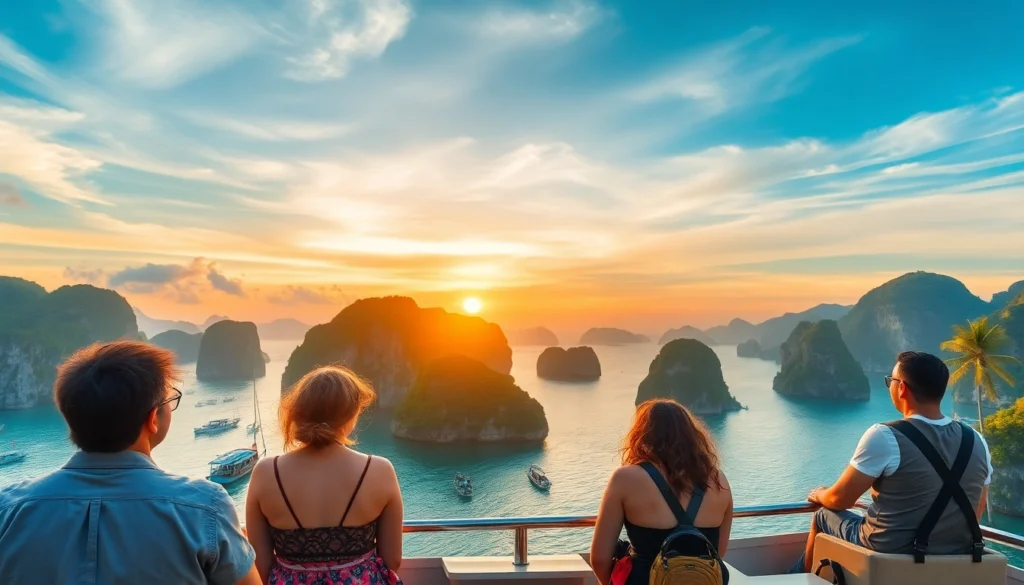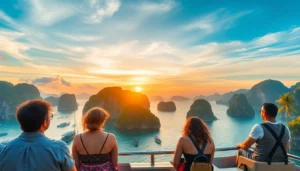Premium Island Tours in Indonesia: Unique Experiences with Local Guides

Understanding the Concept of a Tour in Indonesia
Traveling is a universal passion that transcends cultures and borders, offering individuals the chance to explore new landscapes, immerse themselves in diverse cultures, and create lasting memories. Central to the travel experience is the concept of a tour, a structured journey designed to maximize enjoyment and exposure to a destination’s unique attractions. In Indonesia—a vast archipelago renowned for its rich cultural tapestry, natural beauty, and vibrant traditions—a well-crafted tour can elevate a visitor’s experience from mere sightseeing to profound cultural engagement. Understanding what constitutes a tour, its significance in travel planning, and how it differs from related concepts like trips and excursions is essential for both travelers and industry professionals aiming to deliver exceptional travel experiences.
Defining a Tour and Its Significance in Travel Planning
A tour is fundamentally a planned, organized journey through various destinations, often led by guides or accompanied by detailed itineraries. Unlike spontaneous travel or independent exploration, tours provide structure, convenience, and curated experiences that highlight a destination’s most compelling points of interest. In Indonesia, tours can encompass cultural sites in Yogyakarta, adventure activities in Lombok, or luxury experiences in Bali, catering to diverse traveler preferences.
From the perspective of travel planning, a tour simplifies logistics—transportation, accommodation, entry tickets, and guided commentary—allowing travelers to focus on enjoyment rather than the complexities of navigation and organization. This ease of access ensures a smoother experience, especially for international visitors unfamiliar with local languages, customs, or transportation systems. Additionally, tours foster authentic engagement by connecting travelers with local guides who serve as cultural ambassadors, sharing insights, stories, and traditions that enrich the journey.
In Indonesia, tours can range from day-trips exploring rice terraces in Ubud, to multi-day cultural immersions across Bali, Java, or Lombok. They serve as essential tools for promoting local tourism, supporting small businesses, and preserving cultural heritage by showcasing indigenous practices and artisanship. Therefore, a well-designed tour is not merely a leisure activity but a vital component of sustainable tourism development.
Key Differences Between Tours, Trips, and Excursions
While often used interchangeably in casual conversation, the terms tour, trip, and excursion carry distinct meanings in the travel industry, each serving different purposes and traveler expectations.
- Tour: A structured, often organized journey with a set itinerary, guides, and designated destinations. Typically longer than a trip, tours can span days, weeks, or even months, and may include thematic focuses such as culture, adventure, or luxury. Example: A 7-day cultural tour of Bali and Java with local guides.
- Trip: A more general term referring to any travel experience from a short visit to a distant location. Trips are often less structured and can be spontaneous or planned. They include visits for leisure, business, or research. Example: A weekend trip from Jakarta to Bandung.
- Excursion: A short journey or outing focusing on a specific activity or location, usually within a single day. Excursions are often supplementary to longer trips or tours. Example: A half-day river cruise or museum visit during a tour.
Understanding these distinctions ensures clearer communication and better expectation management for travelers and tour operators. For instance, marketing a “cultural tour” emphasizes organized, immersive experiences, whereas advertising a “day trip” highlights convenience and brevity.
How Tours Enhance Travel Experiences in Indonesia
Indonesia’s diverse landscapes and cultures lend themselves perfectly to the concept of curated tours. Well-structured tours maximize the potential for enriching experiences while minimizing logistical challenges. Here are several ways tours elevate travel in Indonesia:
1. Cultural Immersion
With Indonesia’s fourteen thousand islands, each with distinct traditions, languages, and histories, tours facilitate authentic cultural exchanges. For example, a Java cultural tour might include traditional batik-making demonstrations, gamelan music performances, and visits to UNESCO-listed Borobudur, providing travelers with meaningful engagement beyond superficial sightseeing.
2. Access to Remote or Off-the-Beaten-Path Locations
Many of Indonesia’s most scenic or culturally significant sites are difficult to access without assistance. Guided tours help travelers reach remote villages in Borneo, pristine beaches in the Mentawai Islands, or hidden waterfalls in Bali’s jungles, which might otherwise be challenging to visit independently.
3. Educational Opportunities
Local guides and expert storytellers provide context, history, and folklore, transforming sightseeing into learning experiences. Tours often include lectures, workshops, or interactions with artisans, deepening travelers’ understanding of Indonesian heritage.
4. Safety and Convenience
Structured tours reduce risks associated with unfamiliar environments, especially for international travelers unfamiliar with local customs and regulations. They also streamline transportation, accommodations, and entry procedures, making travel seamless.
5. Support for Local Economies
Tour operators often collaborate with local businesses—hotels, restaurants, craft artisans—which bolsters community income and contributes to sustainable development. An ethically managed tour ensures travelers contribute positively to local livelihoods.
Designing the Perfect Tour Package in Indonesia
Creating an ideal tour package involves understanding the diverse needs of travelers and weaving together experiences that balance excitement, education, comfort, and authenticity. Here’s a comprehensive guide to designing compelling tours in Indonesia:
Types of Tours Available
- Cultural Tours: Focused on historical sites, local traditions, and arts. Examples include temple visits, craft workshops, and traditional dance performances.
- Adventure Tours: Designed for thrill-seekers, encompassing trekking, diving, surfing, or wildlife safaris—such as volcano hikes on Krakatoa or jungle expeditions in Sumatra.
- Luxury Tours: Catering to high-end travelers seeking premium services, private guides, exclusive villas, and gourmet experiences, like private yacht cruises around Raja Ampat.
Customizing Tours to Suit Different Traveler Preferences
Flexibility is key in modern travel. Offering customizable options—such as selecting specific activities, adjusting pace, or focusing on thematic interests—empowers travelers to personalize their experience. For instance, a family-oriented tour can include kid-friendly activities, while a honeymoon package emphasizes romance and relaxation.
Incorporating Local Attractions and Authentic Experiences
Authenticity draws travelers seeking genuine interactions. Integrate visits to traditional villages, local markets, and indigenous communities. Encourage participants to participate in cooking classes, traditional ceremonies, or artisan workshops, ensuring a meaningful connection to Indonesian culture.
Best Practices for Organizing Seamless Tours
Exceptional tour organization is vital for maintaining reputation, ensuring safety, and delivering memorable experiences. Here are essential best practices:
Partnering with Reliable Local Guides and Agencies
Building relationships with experienced, knowledgeable guides and reputable local agencies ensures quality, safety, and cultural sensitivity. Selecting guides fluent in multiple languages and well-versed in local history enhances the authenticity and engagement of the tour.
Ensuring Safety, Comfort, and High-Quality Services
From transportation to accommodation, safety protocols and comfort standards must be prioritized. Regular maintenance of vehicles, quality hotel partnerships, and adherence to health regulations are non-negotiables. Providing detailed briefings and emergency procedures further guarantees traveler confidence.
Utilizing Technology for Booking, Navigation, and Feedback
Implement digital solutions such as online booking platforms, GPS navigation tools, and real-time feedback systems. This approach streamlines operations, allows for data collection on traveler preferences, and facilitates continuous improvement.
Measuring Success and Improving Your Tour Offerings
Continuous evaluation is crucial for maintaining competitive edge and elevating tourist satisfaction. Here are effective methods:
Collecting Traveler Feedback and Reviews
Use surveys, online reviews, and direct communication to gather insights on Tour quality, guide performance, and overall satisfaction. Diverse feedback helps identify strengths and areas for improvement.
Tracking Key Performance Indicators (KPIs)
Monitor metrics such as occupancy rates, repeat bookings, customer satisfaction scores, and social media engagement. Data analysis provides actionable insights to optimize tour offerings.
Adapting Tours Based on Market Trends and Customer Needs
Stay attuned to evolving traveler preferences—such as interest in eco-tourism, wellness tourism, or digital experiences—and adjust tour structures accordingly. Incorporate new destinations, activities, and sustainable practices to meet contemporary demands.
Promoting Your Tours Effectively to Reach More Travelers
Effective marketing maximizes visibility and attracts a broader audience. Key strategies include:
Leveraging SEO and Targeted Digital Advertising
Optimize your website with relevant keywords like “tour” tailored for Indonesia, ensuring high rankings on search engines. Use targeted ads on social media platforms and search engines to reach specific demographics interested in Indonesian tourism.
Creating Engaging Content and Visuals
Produce high-quality blogs, videos, and virtual tours showcasing vibrant destinations, traveler testimonials, and unique experiences. Authentic storytelling engages potential customers emotionally and encourages bookings.
Building Partnerships with Travel Platforms and Influencers
Collaborate with popular travel websites, booking engines, and social media influencers specializing in Indonesian travel. These partnerships expand reach and lend credibility to your tour offerings.





